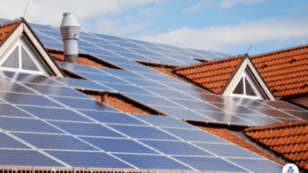
How Much Do Solar Panels Cost in Mississippi? (2024 Savings Guide)
In this guide on the cost of solar panels in Mississippi, you’ll learn:
- What the average cost of going solar in The Magnolia State is
- How Mississippians can save money when going solar
- Which local installation companies have the best prices
Each product and or company featured here has been independently selected by the writer. You can learn more about our review methodology here. If you make a purchase using the links included, we may earn commission.
Converting to solar in Mississippi is usually a great investment, with panels typically paying for themselves in 13 years and then saving an additional $28,416 on electricity bills thereafter, on average. Unfortunately, one of the biggest roadblocks for residents to commit to a solar array and convert to clean energy is the high cost of panels.
In this guide, we’ll be discussing the average cost of solar panels in Mississippi, plus some factors to consider to make sure you get an accurate estimate for your system. We’ll also provide some money-saving tips and strategies to help you keep those prices down.
What Will Your Solar Panel System Cost in Mississippi?
The average price of solar panels in Mississippi is around $3.27 per watt.
Most Mississippians need a large 11.5 kilowatt (kW) system to offset their above-average energy demands, which puts the total cost of a solar panel system in the state at $37,605. After the federal investment tax credit (ITC) is taken, that total can drop down to an average of $26,324.
Since systems are priced on a per-watt basis, the size of the system you need will usually be one of the most significant cost factors. We’ll include prices and long-term savings estimates for different common system sizes in the table below.
| Solar Power System Size | Energy Use (per month) | House Size (sq ft) | Total Cost | Cost After the Federal ITC | Energy Savings (over 25 years, after system is paid off) |
| 9 kW | 900 kWh | 1,600 | $29,430 | $20,601 | $18,489 |
| 10 kW | 1,000 kWh | 1,800 | $32,700 | $22,890 | $20,109 |
| 11 kW | 1,100 kWh | 2,000 | $35,970 | $25,179 | $21,729 |
| 12 kW | 1,200 kWh | 2,200 | $39,240 | $27,468 | $23,349 |
| 13 kW | 1,300 kWh | 2,400 | $42,510 | $29,757 | $24,969 |
| 14 kW | 1,400 kWh | 2,600 | $45,780 | $32,046 | $26,589 |
| 15 kW | 1,500 kWh | 2,800 | $49,050 | $34,335 | $28,209 |

Blue Raven Solar
Pros
- Industry-leading in-house financing
- Competitive pricing
- Excellent reputation
Cons
- Doesn't offer solar batteries (coming 2022)

Mississippi Solar, LLC

Solar Alternatives

Regional Service
Average cost
Pros
- Great warranty coverage
- Outstanding customer service
- Multitude of products and services
Cons
- No leases or PPAs
How Do Mississippi’s Solar Prices Compare to the National Average?
The per-watt price for solar equipment in Mississippi is slightly below average, sitting at $3.27, while the national average is $3.33. That means that, on a watt-per-dollar basis, you get a little more for your money in Mississippi than you would in most other states.
However, Mississippi homeowners use more electricity on a monthly basis than most U.S. residents, with the state’s monthly consumption averaging 1,146 kilowatt-hours (kWh). Since the national amount of electricity used per month is only 881 kWh, that means Mississippi residents need larger systems to offset their energy needs.
Larger systems mean more panels and watts, which translates to higher overall system costs. The average price in Mississippi before the tax credit is $37,605, which is almost $8,000 higher than the national average of $29,970. After the tax credit, the price in the Magnolia State is approximately $26,324, which is almost $6,000 higher than the U.S. average of $20,979.
While your money on a per-watt basis goes further in Mississippi, the higher energy demands in Mississippi mean you’ll pay significantly more for your solar array overall.
What Are the Main Factors of Solar System Costs in Mississippi?
Average pricing for solar arrays is helpful to get a baseline, but it’s not uncommon for prices to vary by thousands of dollars. While the average cost of a solar power system in Mississippi is $26,324, prices commonly range from $20,601 to $34,335 after the federal credit. Some of the most significant cost factors in the state include the following:
- The above-average energy demands in Mississippi
- The lack of a widespread net metering policy in Mississippi
- The above-average amount of sunlight availability in Mississippi
We’ll explain how each of these factors affects your all-in pricing for solar equipment in the following sections.
The Above-Average Energy Needs in Mississippi
Since the most significant cost factor for solar equipment is usually the size of the system required, which is driven by your monthly energy consumption, it follows that the above-average energy demands in Mississippi play a major role in pricing.
Mississippians consume around 1,146 kWh per month, which is well above the national average. In order to offset that consumption, residents need to install larger systems to provide greater production capability. The typical array size required in the area is 11.5 kW, which is 2.5 kW larger than most Americans need.
At the average cost per watt in the state of $3.27, that means the typical system is almost $6,000 more expensive than it would be if system size requirements were average. We still strongly recommend sizing your system appropriately for your consumption to get the highest long-term savings, but note that you will pay more for a larger system.
The Net Metering Policy in Mississippi
Net metering — also called net energy metering or NEM for short — is a policy that lets you bank excess power production and call on it for free when your panels underproduce, like on cloudy days or at night. Having access to net metering makes eliminating your utility bills possible and always provides greater savings over time compared to having no access to NEM.
Mississippi does mandate net metering but only for investor-owned utilities (IOUs), including Tennessee Valley Authority. Most residents are serviced by electric cooperatives, which means most won’t have access to NEM.
That means that solar batteries, which give you access to effective net metering, are wildly popular in the state. Solar batteries typically pay for themselves and generally provide net savings in the state due to the lack of a state-wide net metering program, but they do add $10,000 or more to your system costs, on average.
This does contribute even more to the above-average system price in the area, but we recommend investing in a battery if you are serviced by an electric cooperative and don’t have access to net metering.
The Abundance of Sunlight in Mississippi
Finally, Mississippi residents see an average of 216 sunny days per year, which is more than most U.S. homeowners see. In areas with below-average sunlight availability, high-efficiency panels — which are more expensive per watt — are often necessary to make the most of the sunlight that is available and maximize savings.
In an area like Mississippi, where sunny weather is more prevalent than in other states, maximizing panel efficiency rating isn’t absolutely necessary. That means you can afford to install more affordable panels that have slightly lower efficiency ratings and still see sufficient production. This is especially true since electricity rates are below average, which means the financial risk of not totally offsetting your consumption is also below average.
Ultimately, the sunlight availability in Mississippi helps keep installation prices down. We’d recommend choosing a tier-one monocrystalline panel still, and it’s best to opt for an efficiency rating of over 20%, but topping out with something like Maxeon panels at 22.8% isn’t totally necessary.
Watch Below: Learn How You Can Profit Off Of the Extra Energy Your Solar Panels Produce
Additional Costs of Going Solar in Mississippi
The panels and major add-on products like batteries will absolutely make up the bulk of your installation costs. However, there are some other charges to consider, which your installer may or may not include in the per-watt price. We’ll include a quick list of other charges you may encounter below.
- Additional solar equipment: In addition to panels and any add-on products you choose to install, your system will also require wiring, conduit to protect the wiring and inverters to connect your system to your home. You might also want to opt for squirrel guards. Overall, these additional pieces of equipment could bump up your installation costs by a few hundred dollars, but keep in mind that some installation companies include these charges in their initial per-watt pricing.
- Building permits and inspections: All municipalities in Mississippi require building permits for rooftop solar systems. Permits often come with filing fees, which usually total between $50 and $350 in Mississippi, depending on where you live. You can connect with a reputable solar installer or your local building department to find out the exact amount your permits will add to your system total.
- Interconnection application fees: Your solar panel system will be backed up to the power grid in most cases so that you can maintain electricity in your home even when your panels aren’t producing sufficient energy. Most electric companies in Mississippi charge between $25 and $150 for the interconnection application fee. This is usually paid by your installer, but the charge will be passed on to you.
- Product markup and administration fees: Finally, each installer in the state can mark up equipment prices differently to maximize profit for the company or savings for you. Some also charge admin fees for things like filing for solar incentives and permits for you. In total, these charges usually add up to a few hundred dollars, but they can reach into the thousands.
What Maintenance Costs Can Solar Owners Expect in Mississippi?
Installing panels in Mississippi is quite expensive, but the lack of ongoing fees for maintenance should be some consolation. Generally speaking, your manufacturer’s warranty and labor warranty should cover most of the issues you’re likely to run into with your panels and other equipment, so it’s not typical to have to pay for panel repairs or upkeep.
Some solar customers pay between $100 and $150 twice a year to have their panels cleaned, as this removes debris from the surface and improves panel performance. However, these services are usually not necessary, especially in an area like Mississippi; the above-average rainfall in the state should keep your panels clean enough.
Which Solar Financing Options Will Help You Save the Most in Mississippi?
There are four primary ways to pay for your solar panels in Mississippi: cash, a solar loan, a solar lease or a power purchase agreement (PPA). You might not have access to all of these options, depending on the installer you choose to handle your solar project.
Overall, we recommend a cash purchase to all solar customers. Paying in cash will lead to instant panel ownership and allows you to avoid paying interest on a loan. That means you’ll see the fastest panel payback period, which will, in turn, lead to the greatest solar savings over time, based on the interest rate.
A cash payment also gives you access to the federal tax credit, a perk from the federal government that holds an average potential value of $11,282 in Mississippi.
However, paying in cash is the least accessible option, and it’s less accessible in Mississippi than in most other states because of the above-average conversion costs in the area.
If you can’t make a cash purchase work, we recommend going with a solar loan. A loan still lets you take the federal credit, but it leaves you with a minimal and more realistic down payment — often $0 — and lets you pay off your system over an average of eight to 20 years. You will pay interest, though, which will cut into your savings and extend your repayment time.
If you can’t make a cash purchase work and won’t qualify for a loan, a lease is your next best option. Leases preclude you from taking the federal credit, which is a major downside, and they don’t lead to panel ownership, so your savings over time will be limited. However, they’re far more accessible than both cash payments and loans.
We generally don’t recommend a PPA unless it’s your only option. PPAs save you the least over time, don’t let you take the federal tax credit and don’t lead to panel ownership. It’s also worth mentioning that both leases and PPAs can complicate the sale of your home, and they don’t bump up your property value like cash payments and loans would.
To find the option that works best for you, we recommend first using our solar calculator to see what your solar array will cost. Once you have a personalized estimate, you can figure out which of the financing options you can afford and choose the one that’s most beneficial.
You can use the table below to figure out which option is best. If you’re undecided, we recommend considering going solar through SunPower or Tesla, both of which accept all four payment options.
| Financing Method | Total 25 Year Savings (estimated) | Initial Costs (estimated, after the federal tax credit) | Monthly Payments (estimated) | Payback Period (estimated) |
| Cash | $28,415 | $26,324 | $0 | 13 years |
| Loan | $23,000 | $0 | $100 – $250 | 17 years |
| Lease | $5,000 | $0 | $140 | N/A |
| Power Purchase Agreement | $4,000 | $0 | $140 | N/A |
What Are Other Ways You Can Save When Going Solar in Mississippi?
Choosing the right financing option for you can be a great way to keep upfront costs and long-term system costs down, but there are some other things you can do to save. These include the following in Mississippi:
- Installing a solar battery
- Taking advantage of the solar benefit programs in Mississippi
- Choosing a mid-tier panel brand
We’ll explain how these strategies can help you save in the following sections.
Install a Solar Battery
A great way to save money over time when going solar in Mississippi is to install a solar battery alongside your panels. Solar batteries will increase your installation costs by $10,000 or more in most cases, but they typically pay for themselves over time.
Most Mississippi residents won’t have access to net metering, which is mandated by the Mississippi Public Service Commission (PSC) but only for IOUs. Without net metering, eliminating your energy bill usually isn’t possible because you’ll always have energy consumption at night and on cloudy days when your panels underperform, at which point you’ll have to pay the retail rate for your power.
Installing a solar battery lets you store excess energy and use it to offset consumption when the sun isn’t shining. Over the life of your renewable energy system, it’s likely that your battery will pay for itself and provide additional savings as well.
Take Advantage of State Incentives
Another great way to save money on your renewable energy system is to take any and all solar incentives that are available to you. Unfortunately, these are few and far between in Mississippi, but anything helps.
The most critical incentive to take is the federal tax credit, which provides a credit to your income taxes owed for 30% of your PV system cost. In Mississippi, the average credit amount is $11,282, which can lead to substantial effective savings in the first year after your panels are installed. All Mississippi homeowners have access to this perk.
While there are no additional state-wide incentives other than net metering — which is limited to IOUs — there are some local perks that can help you save. You can head over to our guide to Mississippi solar incentives for more information, but below are some of the utility companies and municipalities that offer solar and energy efficiency rebates and perks:
- Entergy Mississippi
- Mississippi Power
- Pearl River Valley Electric
- Atmos Energy
- Coast Electric Power Association
- Singing River Electric Power Association
- Southern Pine Electric Power Association
Choose a Mid-Tier Panel Brand
Finally, you can save a few hundred or thousand dollars by choosing a mid-tier panel brand. In states where the sunlight availability is limited, we strongly recommend high-efficiency panel brands like Maxeon. These make the most of the available sunlight by providing higher production levels than other brands, but they come at a much higher cost.
Since residents see an above-average number of sunny days per year, they can usually get away with lower-efficiency panels and still offset the majority of their consumption.
Choosing a brand in the 20-21% efficiency range like, Trina, Silfab and Canadian Solar, over the industry leader — Maxeon — will usually save an average of between $3,000 and $5,000 on your system overall.
What Are the Typical Costs of Mississippi’s Solar Installers?
The company you choose to handle your solar panel installation can affect your pricing as well, as each provider charges different amounts for labor and marks up products differently.
The table below includes some relative pricing for what we believe are the best solar companies in Mississippi. This should help you decide which are likely to meet your needs and remain within your budgetary constraints.
| Solar Company | Superlative | EcoWatch Rating (Out of 5.0) | BBB Rating | Average Price ($–$$$$$) |
| SunPower | Best National Provider | 5 | A+ | $$$$ |
| ADT Solar | Best Warranty Coverage | 4 | A+ | $$$ |
| Tesla | Best Technology | 4.5 | A+ | $$ |
| Solar Alternatives | Best Regional Provider | 4 | A+ | $$$$ |
| Mississippi Solar, LLC | Best Local Installer | 4 | A+ | $$ |
How Are Solar Costs and Regulations Trending In Mississippi?
The prices of solar panels in Mississippi have dropped by 54% over the past ten years, according to the Solar Energy Industries Association (SEIA). To put that into perspective, the typical system required in the state that costs $26,324 after the federal credit today would have cost over $52,000 a decade ago.
A big reason for this price drop is how advanced the panel production process has become. As more and more people are adopting solar, the demand for panels has increased, and production has gotten more streamlined and efficient. There’s still plenty of room for the solar industry to grow and gain popularity, so we expect the price of panels to continue to come down in Mississippi in the near future.
As far as benefit programs go, we don’t expect the same kind of positive change, unfortunately. Mississippi currently does not have a renewable portfolio standard (RPS) goal, and since this goal is often what leads to new perks being offered and existing ones getting upgraded, we don’t think it’s likely that these things will happen in Mississippi anytime soon.
In fact, if there is a change, we’d expect that it would be a negative one related to the net metering policy. Although it won’t affect most residents, as most don’t have access anyway, we’d expect that the net metering policy would be downgraded or abandoned, which is happening in many other states.
Since prices are lower than ever before and incentives likely aren’t going to change for the better anytime soon, there has never been a better time to adopt solar power in Mississippi than right now. You can start getting free quotes for your system to take advantage of the current prices by using the tool below.
Read More About Going Solar
- What Are the Best Solar Installers in Mississippi?
- Is it Worth Going Solar in Mississippi?
- How Much Can You Save With Solar Incentives in Mississippi?
The cost information presented in this article is derived from a comprehensive analysis, incorporating data from multiple industry sources. The average cost per watt per state was calculated based on figures from Consumer Affairs, Energy Sage, and Berkeley Lab’s Electricity Markets & Policy Department. Additionally, monthly energy consumption and the average monthly cost of electricity were sourced from the U.S. Energy Information Administration, ensuring a well-rounded and accurate representation of the information presented.
FAQs: Mississippi Solar Panel Costs
We frequently get questions from Mississippi residents about the cost of solar panels and the savings they can expect to see. We’ll answer some of the more common questions we see below.
For most residents, yes, going solar is worthwhile in Mississippi. Although the average price of a system is well above the national average, residents also have higher electricity bills to offset than most Americans, which means a greater potential for savings. The average solar energy system in Mississippi pays for itself in 13 years and then delivers more than $28,400 in net savings after that point.
No, Mississippi does not have a state solar tax credit. However, all Mississippi residents have access to the federal solar tax credit, which provides a credit to income taxes for 30% of the entire system cost. Thanks to the above-average conversion prices in the Magnolia State, the federal credit holds an average potential value of over $11,250 in the area.
Solar equipment in Mississippi typically costs around $3.27 per watt. For the average 11.5 kW system required in the state, that comes out to a total installation cost of $37,605, which can be knocked down to $26,324 after taking the federal tax credit. These prices are above the national average, but a system in Mississippi should pay for itself and save more than $28,400 after that point.
Related articles
Top Solar Installers in Mississippi Cities
Comparing authorized solar partners
-
- Industry-leading in-house financing
- Competitive pricing
- Excellent reputation
- Doesn't offer solar batteries (coming 2022)
A+Best Solar Financing2014Trina Solar, Canadian Solar, SolarEdge, Silfab, SunPower25-year manufacturer warranty; 10-year workmanship warranty, 2-year production guarantee
Having trouble deciding? Click below and use our process to receive multiple quotes instead:

 233k
233k  41k
41k  Subscribe
Subscribe 







